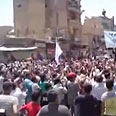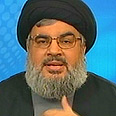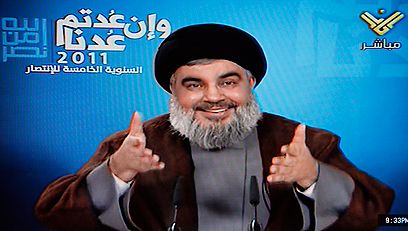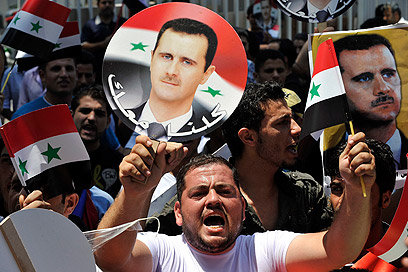
_a.jpg)

As Syria's crackdown on protesters gets bloodier, it is having repercussions for one of Damascus' most crucial allies, eroding the reputation of the Lebanese militant group Hezbollah.
At recent protests, Syrians demonstrating against President Bashar Assad have also unleashed their anger at the Shiite Hezbollah over its blunt support for the regime. Some protesters have set fire to the yellow flag of Hezbollah and pictures of the group's leader, Sheik Hassan Nasrallah.
- Receive Ynetnews updates
directly to your desktop
Such outcry is startling in a country that prides itself for being a bastion of resistance against the US and Israel and has lionized Hezbollah. Syrians and Arabs around the region have in recent years elevated Nasrallah to the status of a nationalist hero after his guerrillas' 2006 war with Israel, and posters of the turbaned, bearded sheik are one of the top selling items in Syrian souvenir shops.
The anger at Hezbollah illustrates the delicate, contradictory position of the Shiite movement. On the one hand, the source of its popularity even among many Sunnis in the region has been its image as a patriotic force to defend Lebanon against Israel, and it is highly protective of that image. On the other, its close alliance to Syria and, even more, to Iran make it vulnerable to accusations that it is merely a well-armed tool for those regimes.
Newly released indictments by the International Criminal Court accusing four Hezbollah members in the 2005 assassination of former Prime Minister Rafik Hariri, Lebanon's most powerful Sunni leader, further cast a shadow over its reputation.
Double standards
Hezbollah backed the anti-regime uprisings in Egypt, Yemen, Bahrain and Tunisia. But it publicly sided with Iran and Syria in their brutal crackdowns on protesters.

Hezbollah Secretary General Nasrallah - ignoring Syrian issue
"Hezbollah always criticizes the double standards of the West, but it has done worse," said Amjad, a protester from the Syrian city of Hama, which for the past week has been under a crushing siege by Assad's forces.
"We feel betrayed," he said. Amjad spoke on condition his full name not be used because of fears of reprisals.
In a sign of its wariness over the damage to its reputation, Hezbollah has avoided talking about Syria's uprising. The movement has gone out of its way to strongly deny repeated, though unverified claims, by Syrian activists that Hezbollah fighters - as well as Iranians - are involved in crushing demonstrations and killing protesters. In his recent speeches, Nasrallah has kept his comments on Syria down to a minimum.
But as a close ally of Damascus, Hezbollah could not avoid the subject completely, and its Manar TV station has adopted the Syrian government line blaming the unrest on armed extremist groups. Early on in the uprising, Nasrallah embraced Assad, casting him as a reformer, in a speech that infuriated Syrian protesters.
"Toppling the resistance regime in Syria, which is ready for reform, would provide a great service to Israel and to US control over the region," he said.
Officials of the group contacted by The Associated Press declined to comment about the Syria uprising or its repercussions on Hezbollah, saying their chief was the only person authorized to talk about the subject.
"As the repression in Syria intensifies ... Hezbollah will find itself spending more of its reputation and political capital in support of a regime that is on its way out," said Randa Slim, a research fellow at the New America Foundation in Washington.
The troubles for Hezbollah come at a time when it should be riding high. It now holds a dominant role in Beirut's government and the prime minister is an ally, giving it unprecedented political clout in Lebanon after its opponents, the US- and Western-backed factions led by Hariri's son Saad, were sidelined. Its extensive arsenal of weapons and rockets is virtually untouchable for the moment, after years of calls for it to disarm.
Worst case scenario
"Militarily, the organization is stronger than ever but its credibility and legitimacy, regionally, have taken a big hit," said David Schenker, director of the Program on Arab Politics at the Washington Institute for Near East Policy.

Support rally for Syria's President Assad in Lebanon
In the early 2000s, Hezbollah was riding on a wave of unprecedented popularity, after its war of attrition forced Israeli troops to withdraw from south Lebanon and end nearly 20 years of occupation. In 2006, it fought Israel to a standstill in a ferocious month long war. Its popularity across the Arab world was so intense there were reports of some Sunnis in Syria and Jordan converting to Shiite Islam.
But in recent years came several blows, starting with the 2008 assassination of its top military commander Imad Mughniyeh in a car bomb in Damascus. A year later, after the US-backed Lebanese government moved to dismantle its telecommunications network, the group briefly seized control of large swaths of Beirut, turning its guns on its local Lebanese foes, something Nasrallah had swore the group would never do.
Last month, Nasrallah revealed that a ring of CIA-recruited spies within Hezbollah had been uncovered, a stunning security breach for the group.
The indictments for the Hariri killing, in which Hezbollah denies any role, damages the group's crossover appeal in the Mideast's sectarian divides. "The Sunnis will understand this in purely a sectarian context, that the Shiites murdered the head of the Sunni community, period," said Schenker.
The worst case scenario for Hezbollah would be Assad's fall, though for the moment that seems unlikely. A Sunni-led new regime would likely be far less friendly to the group, so regime change in Damascus could cut off a major supply route for Hezbollah's weapons, heavily damage its political clout in Lebanon and knock out a third of the "Iran-Syria-Hezbollah" axis of "resistance" to Israel.
"The demise of the Syrian regime if it happens will definitely be a game changer in the region. Whether and how Hezbollah will weather that development will be a true test of its political prowess and skills," said Slim.
- Follow Ynetnews on Facebook















